Foreign
Senegal Talks Rule Out Presidential Vote Before Sall’s Term Expires
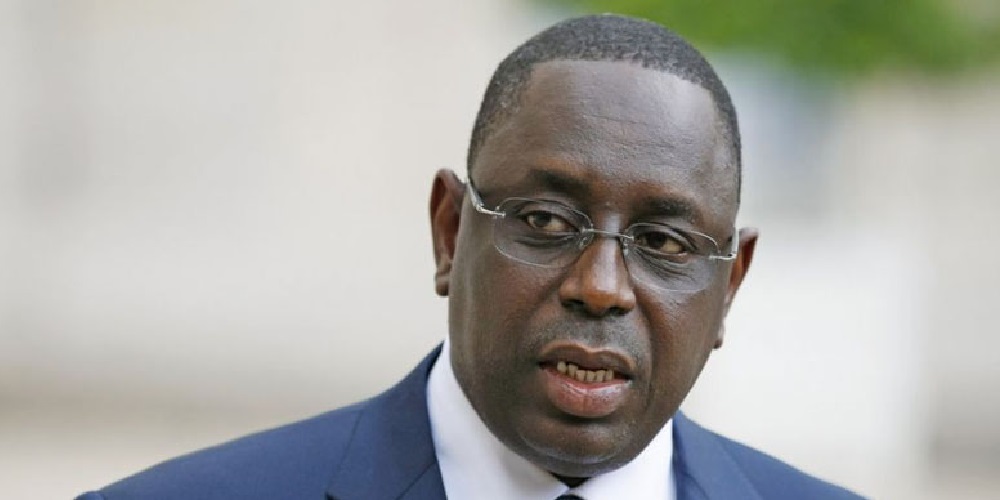
Political crisis talks called by Senegal’s President Macky Sall on Tuesday reached a “broad consensus” that the presidential vote he postponed could not be held before his mandate ends on April 2, multiple participants told AFP.
Sall’s two-day “national dialogue” aimed at setting a date for the delayed election also advocated the head of state remain in office beyond the end of his term and until his successor is installed.
The conclusions go firmly against the view of a widespread political and civic movement, which is demanding the poll be held before April 2.
The traditionally stable West African country is grappling with its worst political crisis in decades after Sall’s last-minute deferral of the February 25 election.
The Constitutional Council overturned the delay and Sall on Monday launched two days of talks to set a new date — boycotted by major political and social actors.
Two committees were formed to discuss the election date and the organisation of the period after April 2.
The first committee came to the almost unanimous conclusion that the vote could not be held before April 2, four participants told AFP.
Two participants, Amar Thioune and Mamadou Lamine Mane, even said there was a “broad consensus” that the presidential election could not be held before June 2.
The second committee came to a “broad consensus” in favour of President Sall remaining in office until a successor is sworn in, six participants told AFP on condition of anonymity.
Some taking part in the talks proposed the vote should take place in July, the same sources told AFP, referring to discussions rather than any written document.
The two committees were due to present their conclusions to the president late Tuesday.
No indication was given as to when Sall would then make a decision.
Last week, he said he would set a date “immediately” if there was a consensus.
– ‘Get it over with’ –
The president has previously cast doubt on the feasibility of staging the vote before the end of his term.
On Monday, he proposed that it could be held by the start of the rainy season in June or July.
Sall had reiterated several times in recent days that his mandate would end as planned at the beginning of April.
But on Monday, he left open the possibility of an extension.
“If there’s a consensus, I’m prepared, in the best interests of the nation, to take it upon myself to stay on even if it’s not my choice,” he said.
“It’s not what I want because I’m in a hurry to get it over with and leave,” he added.
The February 3 decision to postpone the presidential election plunged Senegal into turmoil, with four people killed in clashes.
Sall, in power since 2012, said he called off the vote over disputes about the disqualification of potential candidates and fears of a return to unrest as in 2021 and 2023.
The opposition called it a “constitutional coup”.
The Constitutional Council, the top constitutional body, ruled the delay unlawful and called for the vote to be organised “as soon as possible”.
A possible extension of Sall’s term is likely to raise more constitutional concerns.
The Council said on February 15 that Mr Sall was due to leave office on April 2.
– Boycott –
The movement galvanised against the election delay says the president is playing for time, either to benefit his political allies or to remain in power.
Seventeen of the 19 candidates approved by the Constitutional Council to stand in the presidential poll boycotted Sall’s national dialogue, as did the major civil society collective Aar Sunu Election (Protect Our Election).
The collective had called for shutdowns across the country and a general strike on Tuesday, demanding the poll take place before Sall leaves office.
But the call appeared to go largely unheeded in central districts of the capital Dakar.
“We live from day to day, so we can’t afford to go a day without working, otherwise our families won’t eat,” said shopkeeper Saer Dieng, 37.
AFP
Foreign
Trump urges Russia to ‘get moving’ on Ukraine as Witkoff meets Putin

US envoy Steve Witkoff wrapped up his latest talks with Russia’s Vladimir Putin on Friday, after President Donald Trump urged his Russian counterpart to move quicker to end what he said was the country’s “senseless war” with Ukraine.
Trump has been pressing Moscow and Kyiv to agree on a ceasefire deal but has failed to extract any major concessions from the Kremlin, despite repeated negotiations between Russian and US officials.
The US leader told NBC News last month he was “pissed off” with his Russian counterpart, while top US diplomat Marco Rubio warned last week that Washington would not tolerate “endless negotiations” with Russia over the conflict.
“Russia has to get moving,” Trump wrote on his Truth Social platform, adding that the conflict, which began in February 2022 when Moscow sent troops into Ukraine, was “senseless” and “should have never happened”.
Kyiv and several of its Western allies suspect Russia of stalling the talks on purpose.
Ukraine’s President Volodymyr Zelensky has accused Russia of dragging Beijing into the conflict and on Friday claimed that hundreds of Chinese nationals were fighting at the Ukraine front line alongside Russian troops.
Trump’s post came just before Witkoff’s meeting with Putin at the presidential library in Saint Petersburg, which state news agencies said lasted four and a half hours.
The Kremlin said afterwards only that the meeting had taken place and “focused on various aspects of the Ukrainian settlement”, without elaborating.
Spokesman Dmitry Peskov had said earlier that he expected no diplomatic “breakthroughs” from the talks — Witkoff’s third with Putin since February.
He also said “maybe” to a question about whether a possible meeting between Putin and Trump would be discussed.
– Kellogg’s ‘zones of responsibility’ –
After their last meeting, Witkoff — a long-time Trump ally who worked with the US president in real estate — said Putin was a “great leader” and “not a bad guy”.
The envoy’s praise of a president long seen by the United States as an autocratic adversary highlights the dramatic turn in Washington’s approach to dealings with the Kremlin since Trump took office for a second term.
Despite a flurry of diplomacy, there has been little meaningful progress on Trump’s main aim of achieving a ceasefire.
Keith Kellogg, Trump’s special envoy to Ukraine, suggested British and French troops could adopt zones of control in the country, in an interview with The Times published Saturday.
Kellogg suggested they could have areas of responsibility west of the Dnipro river, as part of a “reassurance force”, with a demilitarised zone separating them from Russian-occupied areas in the east.
“You could almost make it look like what happened with Berlin after World War II,” he told the British newspaper.
“I was speaking of a post-ceasefire resiliency force in support of Ukraine’s sovereignty. In discussions of partitioning, I was referencing areas or zones of responsibility for an allied force (without US troops),” he said later on X.
– ‘Using Chinese lives’ –
Kyiv said this week that its forces had captured two Chinese nationals in the eastern Donetsk region fighting for Moscow.
The Kremlin denied the claim, while Beijing warned parties to the conflict against making “irresponsible remarks”.
“As of now, we have information that at least several hundred Chinese nationals are fighting as part of Russia’s occupation forces,” Zelensky told military chiefs from allied countries in Brussels.
“This means Russia is clearly trying to prolong the war — even by using Chinese lives.”
The Ukrainian leader also called out Russia for having refused a complete ceasefire proposed by the United States with Ukrainian approval a month ago.
Putin last month rejected a full and unconditional pause in the conflict, while the Kremlin has made a truce in the Black Sea conditional on the West lifting certain sanctions.
– Question of trust –
Trump has pushed for a broad rapprochement with Moscow, which has yielded some results.
On Thursday, Russia freed dual US-Russian ballet dancer Ksenia Karelina from prison in exchange for suspected tech smuggler Arthur Petrov, the second exchange between Moscow and Washington in less than two months.
Karelina, arrested last January while visiting Russia to see family, was serving a 12-year sentence on “treason” charges after she donated the equivalent of around $50 to a pro-Ukraine charity.
The head of Moscow’s foreign intelligence service, Sergei Naryshkin, said Friday that Russia would discuss more prisoner swaps in the future.
Russian Foreign Minister Sergei Lavrov said the swaps helped build confidence between the two sides, which deteriorated under former US president Joe Biden’s administration.
“It helps build trust, which is much needed, but it will take a long time to finally restore it,” he told reporters.
AFP
Foreign
FG, stakeholders commend EU over disability rights funds

*Decry USAID funding cut
By Francesca Hangeior
The Federal Government and stakeholders, has applauded the European Union for funding a project aimed at advocating the rights of Persons with Disability in the wake of the halt in funding by the United States Agency for International Development.
They gave the tributes at the official launch of the Disability Rights Advocacy Project for Inclusive Development, a three-year initiative co-funded by the EU in collaboration with the Christian Blind Mission held in Abuja.
The Executive Secretary of the National Commission for Persons with Disabilities, Ayuba Burki, described the project as a welcome development.
He said, “This project is very commendable. As it is a three-year project, it is our desire that this will go as planned for all persons with disability to be involved. Disability programmes are not exclusively the purview of some persons in organisations.
“It means all hands must be on deck, and we must achieve our set goals. So I am delighted and look forward to a successful implementation of this programme in the next three years. We call on other partners to follow suit so that at the end of the day, people living with disabilities can heave a sigh of relief.”
Burki also rued the funding cut of USAID by United States President Donald Trump, saying it will put pressure on many third-world countries.
He also sees it as an opportunity for leaders in the affected countries to look inward and find solutions.
“I will call on African leaders to take up this challenge and look inward. I believe that USAIÐ was doing a great job. But we cannot abandon caring for our people because it pulled out. We need to look inward and re-strategise.
“Who knows? This may be a blessing in disguise. So I don’t see a cause to worry. But it is an opportunity to look inward and solve funding and reprioritise our priorities as a nation. We will be fine at the end of the day,” he stated.
The Founder of The Albino Foundation, Chief Jack Epelle also shared his sentiments.
Epelle warned that Nigeria and many other developing nations cannot continue to depend on USAID funding forever.
He said, “I think it’s a good and bad omen. It is a good omen because it is high time we begin to take our eyes off development funding and begin to develop ourselves so that we, in turn, can fund others. This kind of event should propel us to look inward and begin to see how to meet the needs of the people by ourselves.
“The bad omen is that there are projects USAID has started and individuals were employed. Some projects were expected to run for three to five years. It will create hardships. Several children will be out of school, and many families not sure of where their next meal will come will suffer.”
He, however, praised the European Union for agreeing to undertake the advocacy of persons with disabilities, especially at the grassroots.
Earlier in his address, the CBM Global Head of Programme Implementation, Bright Ekweremadu, said the project couldn’t have come at a better time.
Ekweremadu also hailed the EU for taking up the bold initiative to continue funding humanitarian projects at a time when President Donald Trump halted USAID funding in Africa and other regions.
He said, “We all know what recently happened to USAID. So when you see a global donor or funder for programmes like this, we need to prostrate and think of them for coming to the aid of the less privileged and vulnerable in society.
“Today is a bold declaration of purpose in a shared commitment to a future where every Nigerian, regardless of their ability, has a right to dignity, opportunity and full participation in the society.
“It is our collective response to the persistent inequalities that persons with disabilities face every single day of their lives, sometimes consciously from us. Together, let us build a Nigeria where disability will be recognised, every voice will be heard, and no one is left behind.”
While appreciating the gesture from the audience, the head of the European Union delegation, Wynyfred Egbuson, emphasised the need to advocate for the cause of the less privileged in society.
According to her, the EU-CBM project was signed after a conscious and rigorous exercise of assessing its possible impact.
She said, “Today’s event is an outcome of the long process that started in June 2024 with a call for proposals by civil society organisations and human rights organisations within and outside Nigeria through a competitive and rigorous process that entails three stages of assessment.
“The CBM and its co-implementing partners were selected from 31 applications, leading to the project being launched today. It is estimated that over 25 million people live with disability in Nigeria. This translates to one in every 10 Nigerians.
“Unfortunately, persons with disability are among the most vulnerable members of our society. They face social stigma, exploitation, discrimination and exclusion from participating in the society. We believe that a lot still needs to be done.”
Foreign
China retarliates with 84% tarrifs on US products from 12midnight
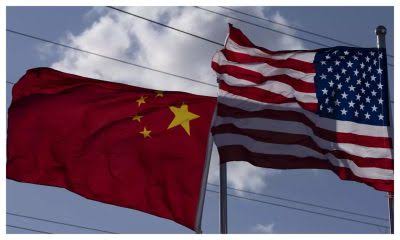
China will impose 84 percent tariffs on US imports, up from 34 percent, the finance ministry said Wednesday, hours after similar levies by the United States came into force.
US President Donald Trump’s latest salvo of tariffs came into effect on dozens of trading partners Wednesday, including punishing 104 percent duties on imports of Chinese products.
Beijing has consistently opposed tariff rises and said Wednesday it would take “firm and forceful” steps to protect its interests.
Its finance ministry later said in a statement that “additional tariff rates” on imports originating in the United States would “rise from 34 percent to 84 percent”, effective from 12:01 pm on Thursday.
“The tariff escalation against China by the United States simply piles mistakes on top of mistakes (and) severely infringes on China’s legitimate rights and interests,” the ministry said.
Washington’s moves “severely damage the multilateral rules-based trade system”, it added.
In a separate statement, Beijing’s commerce ministry said it would blacklist six American artificial intelligence firms, including Shield AI Inc. and Sierra Nevada Corp.
The companies had either sold arms to Taiwan or collaborated on “military technology” with the island, the commerce ministry said.
-
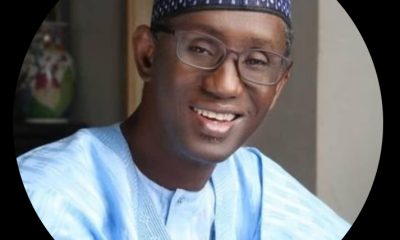
 News7 hours ago
News7 hours agoInsecurity: Criminals Cart Away NSA Ribadu’s Office Hilux During Juma’at Prayer In Abuja
-

 News16 hours ago
News16 hours agoSad! Explosion rocks Lagos
-
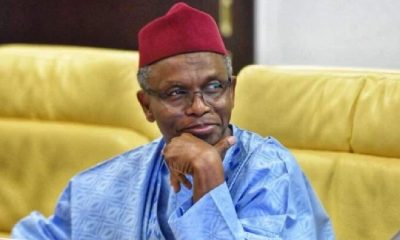
 News16 hours ago
News16 hours agoWe only had lunch with Buhari not 2027 politics -El-Rufai
-
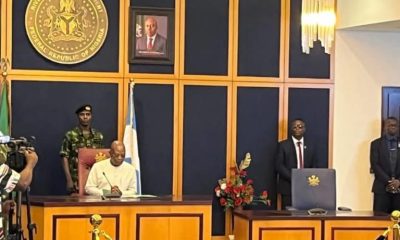
 News15 hours ago
News15 hours agoIbas gives reasons why Sole Administrators were appointed for Rivers councils
-

 News16 hours ago
News16 hours agoParts of Abuja, Niger in total darkness -AEDC confirms
-
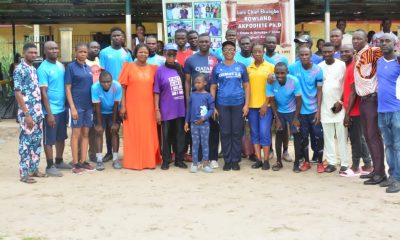
 News10 hours ago
News10 hours agoOERAF Rounds Up Late Chief Ekuogbe Rowland Akpodiete’s remembrance with Novelty Match
-

 News14 hours ago
News14 hours agoUS embassy announces new requirements for visa interviews for Nigerian applicants
-
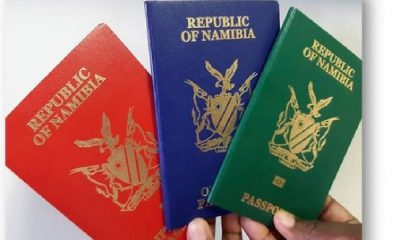
 News14 hours ago
News14 hours agoFive countries with easy work visas in 2025






